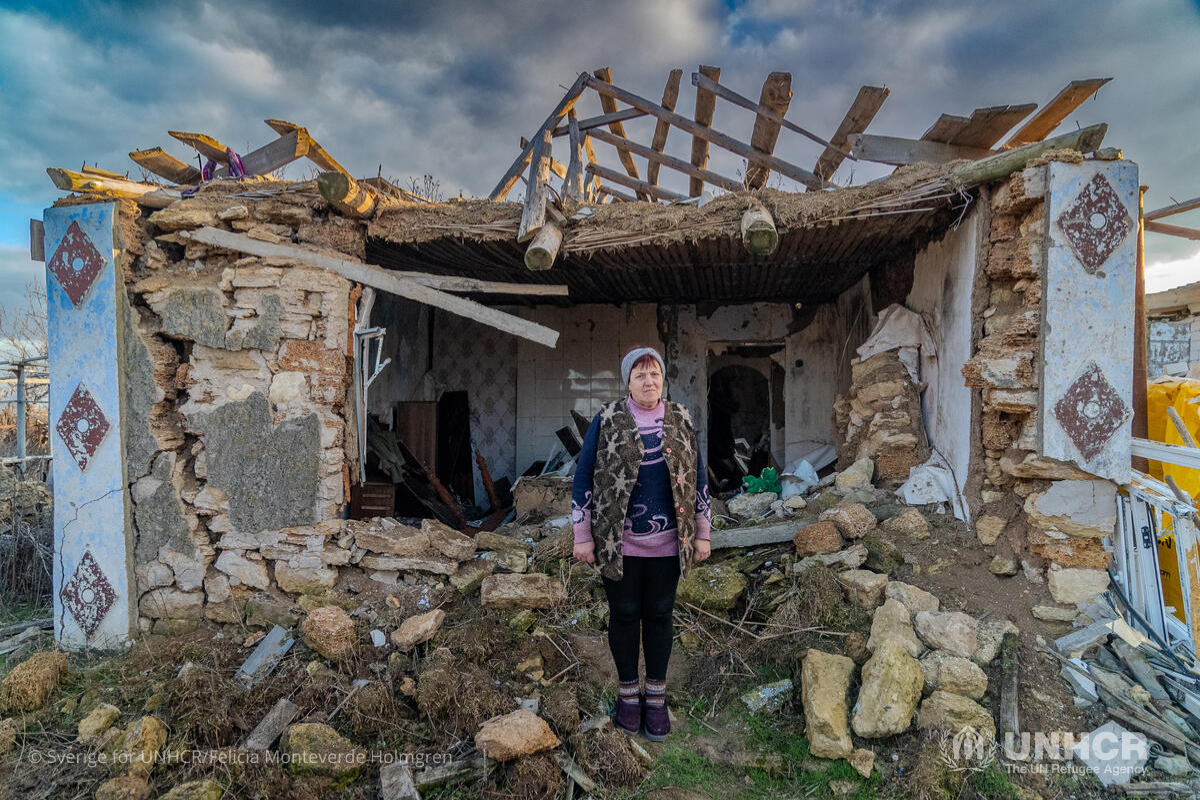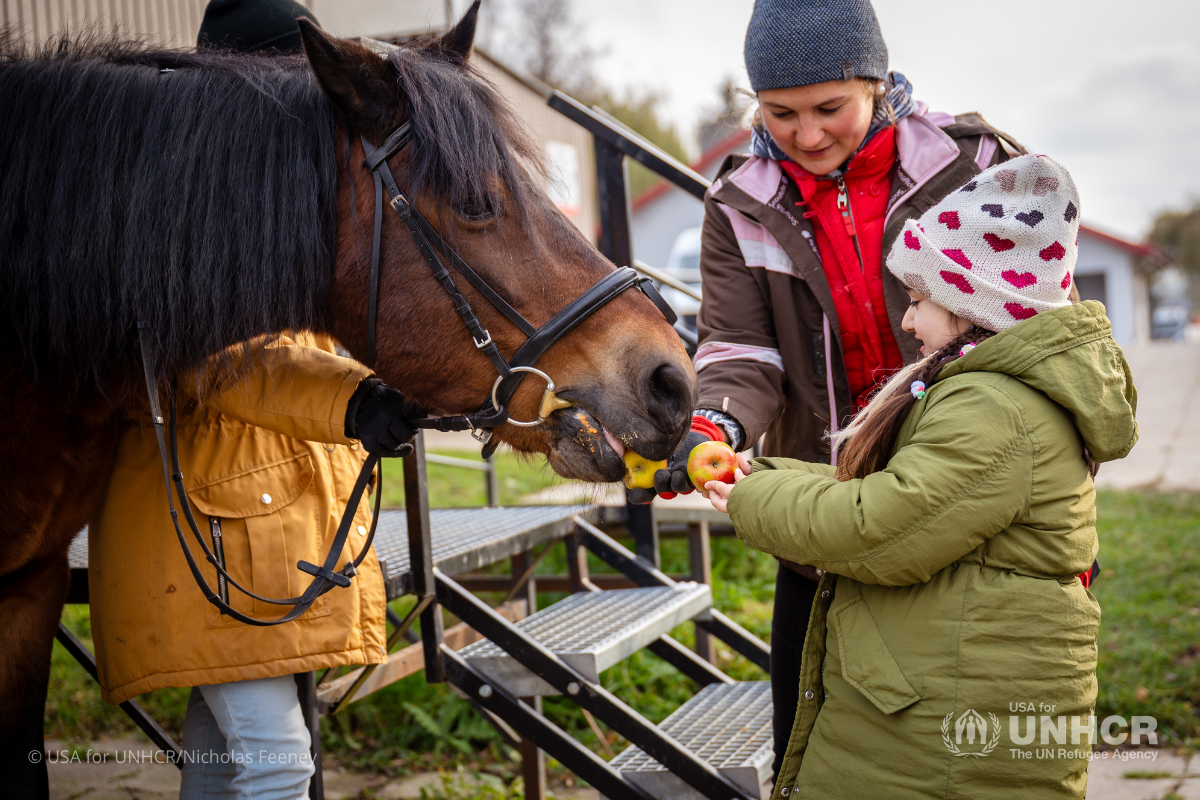From a Refugee Camp to the U.S. Congress: One Advocate’s Tireless Work for Rohingya Refugees
“I believe refugees around the world should hear my story to be inspired, to be encouraged, and to know that stateless and refugee girls can still do anything,” says Lucky Karim, a 20-year-old Rohingya refugee and advocate now living in the United States.
Lucky uniquely understands the vital role storytelling and effective communication play in successful advocacy work. For most of her life, Lucky has been using her voice and stepping into leadership roles.
As the oldest child, Lucky took on a mountain of responsibility at 14 years old when her family was forced to flee violence and persecution in Myanmar. Lucky is a Rohingya, a Muslim ethnic minority from Myanmar who have not been recognized as an official ethnic group and have been denied citizenship since 1982. Lucky's family was forced to flee violent military crackdowns in their village in 2017. They joined nearly a million refugees seeking safety in Cox’s Bazar, Bangladesh. In the chaos of fleeing, Lucky, her mother and her siblings were separated from their father. It was two years before the family was reunited.
“I had a huge responsibility on my shoulders when I first arrived in the camp,” Lucky shares. “It was me who had to make sure my mom met her basic needs, and it was me who had to make sure my brothers were getting basic education, and it was also me who had to make sure I had everything I needed as a girl.”
In the refugee camp, Lucky quickly realized that overcoming language barriers was essential to advocating for her community's needs. Few people could speak Rohingya, Bangla and English in the camp, so communicating needs with NGOs and the host community was extremely difficult. These communication challenges were even greater for women and girls, as they traditionally have fewer opportunities to learn.
With the help of tutors and by watching videos on YouTube, Lucky learned Bangla and English. The speeches and the writings of former First Lady Michelle Obama played a special role in helping Lucky learn English and inspired her community activism. At just 14 years old, she found herself sitting at the table with leaders from the camp, the host community and NGOs like UNHCR that were providing services to the Rohingya.
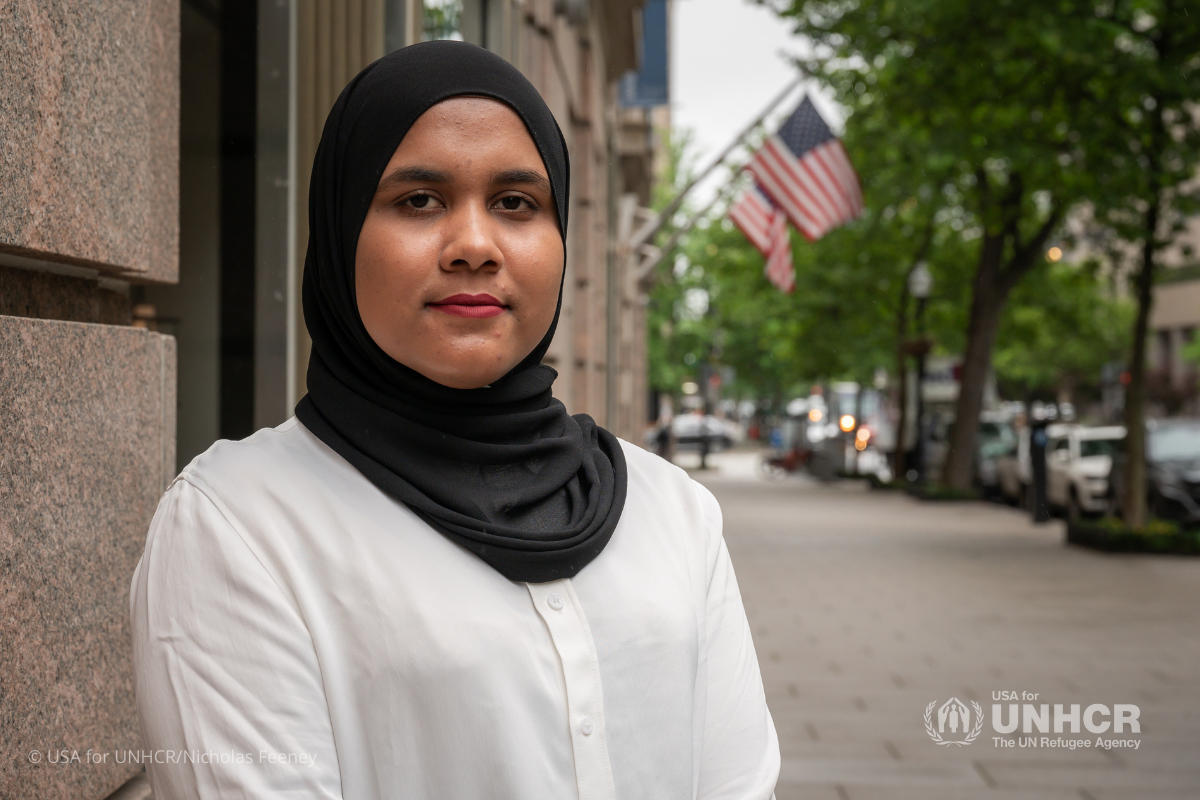
“I started working with international humanitarian organizations, helping refugees by providing assistance to them, providing food, going door to door, visiting with them and learning from their stories and trying to figure out how we can best help them.”
Lucky’s work in the camp centered on family needs assessments. She witnessed that women and girls, in particular, were most vulnerable and at risk. In Myanmar, the Rohingya were often denied access to formal education and many arrived at the camps not knowing how to read or write. Navigating the expansive camp and accessing essential aid like food and fuel from NGO groups working in the camp was a serious challenge.
Lucky worked with a coalition of advocates helping train Rohingya women and girls with basic literacy skills. “Training helped [women and girls] to be able to write their names and to read documents like data registration and the documents needed to get monthly rations from the World Food Program,” explains Lucky.
With a new understanding of the needs of the women and girls in the camp, Lucky sought more ways to get involved and advocate for them. She started working with UN Women to help address the specific needs of women and girls in the camp.
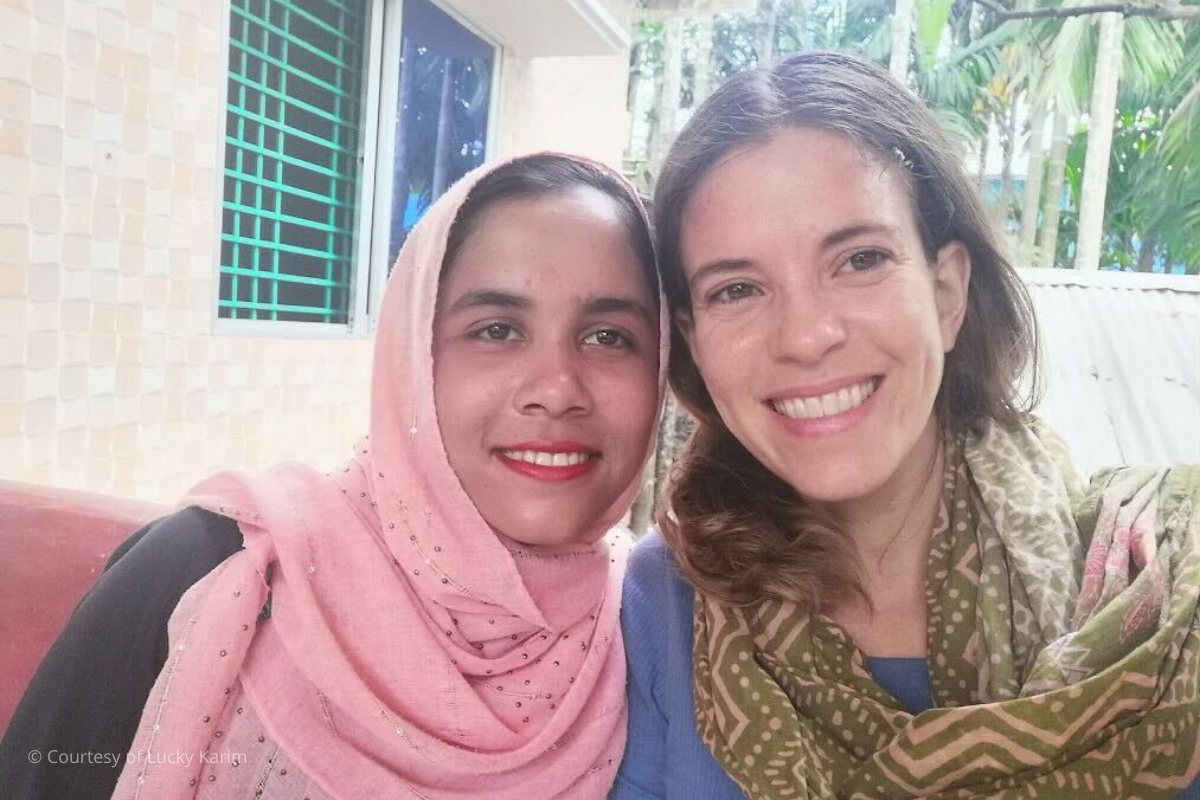
In the camp, Lucky met Jessica Olney, a U.S.-based researcher who lived and worked in Cox’s Bazar in 2018 and has become a lifelong friend and mentor. “Lucky has this innate confidence and trust in herself and her voice only becomes stronger as she becomes more willing to challenge wrong assumptions and fight for better policies and protection for refugees,” Jessica shares. “And when she is in rooms with people who are senior to her, she brings a fresh, youthful perspective that's really important for the future.”
“Lucky was always excited about promoting girls' education,” reflects Jessica. “And when she [later] went to university and learned so much, it made her sad that so few other girls had that opportunity. So she committed herself to the cause of promoting education.”
Soon, Lucky’s advocacy began to find a new audience: NGOs and think tanks based in the United States, like Refugees International, trying to build international support for Rohingya refugee rights.
“I first met Lucky in the camps in Bangladesh,” shares Dan Sullivan, Director for Africa, Asia, and the Middle East at Refugees International and long-time genocide prevention advocate. “I had been doing several advocacy research trips, and she was part of a delegation representing her community. What really stood out was Lucky’s message of advocating for education for the Rohingya and the importance of security and the need for livelihood opportunities.”
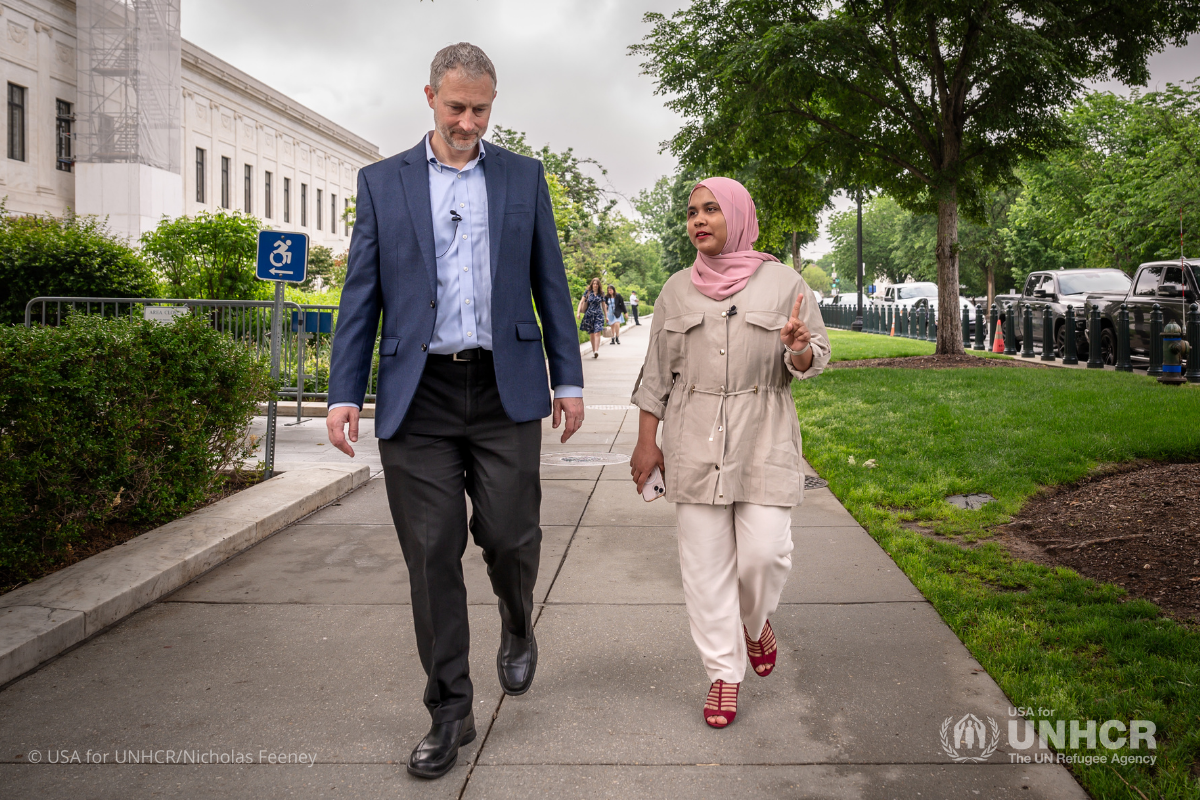
While advocating for protection and education opportunities for her community, Lucky continued pursuing her educational goals. In 2019, Lucky earned a scholarship to the Asian University for Women in Chittagong, Bangladesh. Lucky split her time between living on campus, which is a four-hour bus ride away, and returning to the camp as often as possible to continue her advocacy work and to help her family.
“I had to go back and forth because I was still working for a lot of delegations coming from different countries and helping them with their language translation,” Lucky recalls.
“When I was home at the camp, I had school assignments that I had to complete, but with no internet, with no laptop and with no mobile phone, it was very, very difficult. But going back to the university was also really hard because I still needed to make sure my family had everything they needed.”
For more than a year, Lucky balanced being a student, an advocate for her community and a devoted daughter. In December 2022, the family received unbelievable news: they were selected to be resettled in the U.S. Lucky and her family were among the first Rohingya who escaped the brutal 2017 genocidal attacks to be resettled in the United States.
“The day I arrived in the U.S., I really felt it was my first day in the world because everything was so different: the language, the culture and the rights of people. As a child in Myanmar, I have always seen people fleeing from one place to another. I've always seen my people getting killed, kidnapped and arrested. This was my life experience. In the U.S., I started from scratch and it took time to adapt. It was a big transition.”
Soon after arriving in the U.S., she reconnected with U.S.-based Rohingya advocates she met in the camps in Bangladesh and started going to Washington, D.C., to share her story and further her advocacy work.
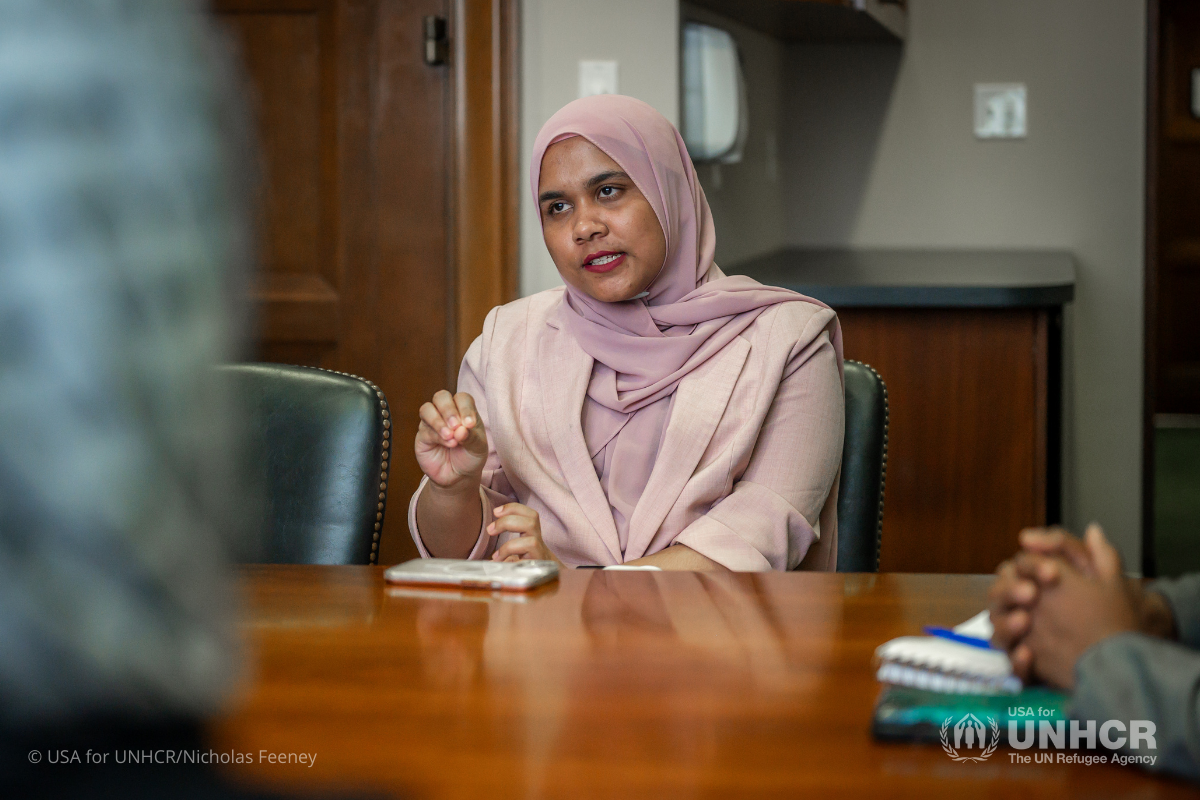
As one of the few Rohingya refugees who has gone directly from living in the camps in Bangladesh to being a public advocate in the U.S., Lucky recalls the personal struggle and challenge of sharing her story. “I used to feel a little nervous. And I used to feel very, very emotional because it's not easy to go back to your past.”
“But now I'm used to it, and I don't cry anymore and I'm much stronger,” she shares with pride.
On a recent trip to Washington, D.C., Lucky reconnected with Mallika Iyer, whom she met in Bangladesh when Mallika worked for the Global Network of Women Peacebuilders.
“You’re talking to the U.S. government, you’re meeting with the State Department and with the Bangladeshi government,” Mallika says to Lucky when they meet. “It just speaks to how much you’ve grown as an advocate and a representative of the Rohingya community. I know that you’re carrying all of the Rohingya girls who can't be here with her, and they know that you’re carrying them.”
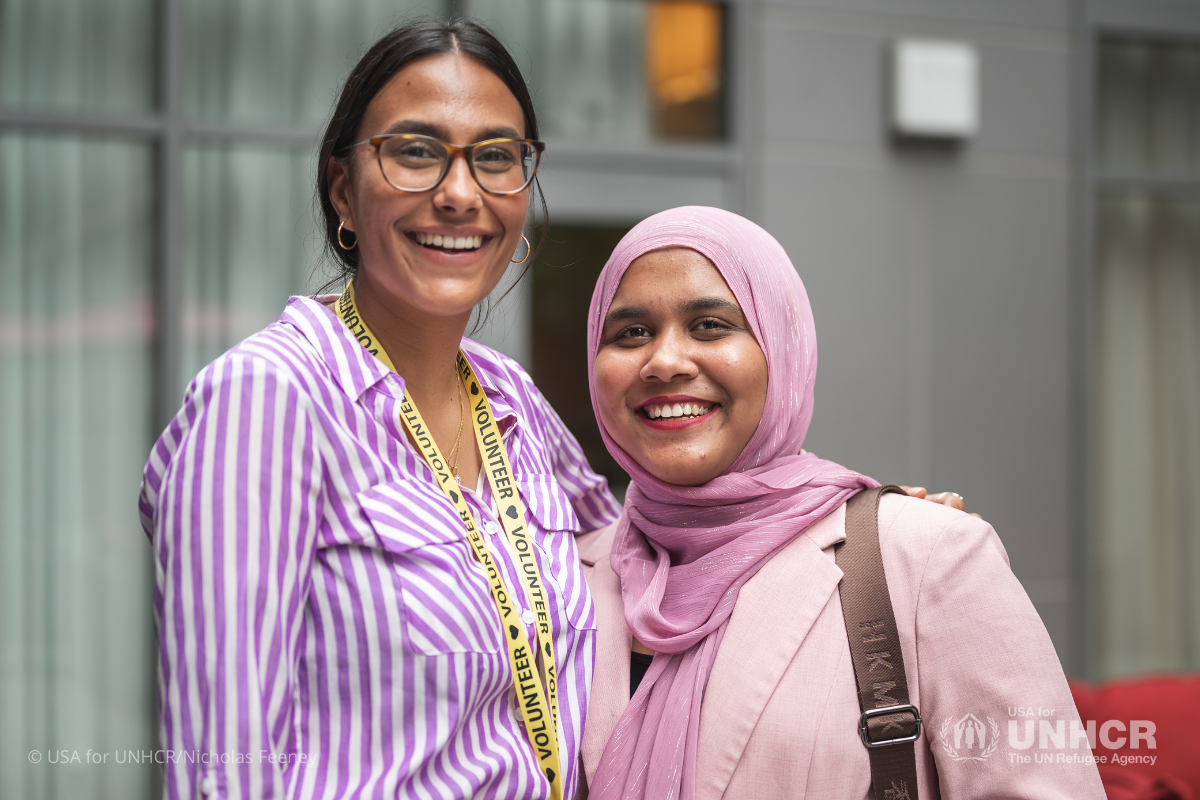
While Lucky is nearly 8,000 miles away from the people she advocates for, she and her family do everything they can in the U.S. to keep parts of their culture close. Cooking traditional Rohingya meals weekly as a family helps keep Lucky rooted in her culture, but language is the most important part of her connection.
“The one thing we do to stay connected to the Rohingya and Burma is speaking the Rohingya language,” says Lucky. “All of us speak Rohingya, which means we never forget Rohingya. And when we speak Rohingya in the family, of course, that's when we feel we're still in Burma.”
Another recent project of Lucky’s keeping her in touch with her Rohingya roots is completing her memoir, Born Lucky. The book details her refugee experience and provides a history of the Rohingya. The intended audience is middle and high school-aged readers, and Lucky hopes it inspires interest and action for Rohingya refugees.
“When I say ‘born lucky,’ of course, I wasn't lucky when I was born, but I made myself lucky, which is why I called the book ‘Born Lucky’.”
Today, the venue for Lucky’s advocacy work for Rohingya rights has shifted from a refugee camp to the halls of the U.S. Congress, but her message is consistent and clear: Rohingya refugees need protection and formal education opportunities so they can rebuild.
“The Rohingya are capable enough if they're given a chance. If they're allowed to go to school, they can do anything. We have people that can be doctors, that can be teachers or engineers. Give them a chance and then see who they can be.”
How can you help
USA for UNHCR, the UN Refugee Agency, supports the entire journey of refugees like Lucky. Not only do our donors help refugees in their greatest time of need, but their support builds awareness for resettled refugees living in the U.S. With your help, more refugees will be able to build a peaceful life and safely pursue their dreams.
